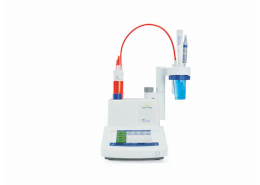Disintegration testing is a US Pharmacopoeia’s internationally accepted procedure. It is employed by scientists and researchers around the world to effectively mimic exposure to harsh stomach acid. This recognized method is used to measure the integrity and durability of our GPS™ enteric-coated capsules following exposure to destructive stomach acid. Further to this, we measure the survival of probiotics contained within. We guarantee the probiotics within our GPS™ enteric-coated capsules survive deadly stomach acid and arrive in the intestines alive. This same testing demonstrates that competitors’ unprotected capsules leak and disintegrate, allowing stomach acid to destroy the probiotics within.
Disintegration Tester
Internationally accepted by the US Pharmacopoeia, and employed by reputable scientists and researchers around the world, it effectively mimics exposure to harsh stomach acid. It is used to verify the integrity of our GPS™ enteric-coated capsule following exposure to destructive stomach acid. It also proves that competitors’ capsules leak and disintegrate, allowing stomach acid to destroy the probiotics within.
Description
Disintegration testers are used to test how a drug in pellet form will disintegrate in solution. Like dissolution testers, they permit researchers and medical practitioners to analyze the in vitro breakdown of powdered compounds for quality control purposes.
Disintegration refers to the mechanical break up of a compressed tablet into small granules upon ingestion and therefore it is characterised by the breakdown of the interparticulate bonds, which were forged during the compaction of the tablet
Quality Control
The disintegration test is a standard quality control test for pharmaceutical dosage forms, ensuring compliance with regulatory requirements.
Summary
In summary, the disintegration tester is a crucial analytical tool in the pharmaceutical industry, playing a key role in ensuring the quality and performance of solid dosage forms. The disintegration test is an integral part of quality control procedures and is essential for regulatory compliance.







